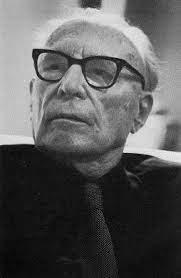Wittfogel, Karl August

Bio: (1896-1988) German-American historian and sociologist. Karl Wittfogel was born in Germany, where he was a member of the Social Democratic and Communist Parties. He received his doctorate from the University of Frankfurt. After the Nazi Party came to power in Germany, he emigrated to the United States.
Wittfogel is best known for his "hydraulic thesis", which he presented most thoroughly in the book Oriental Despotism (1957). The hydraulic thesis is a hypothesis about the emergence of the first states on the territory of Asia and Egypt. Wittfogel starts from Marx's concept of the "Asian mode of production" in order to explain the origin and development of oriental despotic states. According to Wittfogel, the Asian way of production is a product of specific ecological circumstances. In the valleys of large rivers (Nile, Indus, Yangtze, etc.), societies have developed irrigation technology to increase agricultural production.
As agricultural production and population increased, these irrigation systems became more complex over time, so a high level of cooperation and central planning was needed to maintain these systems. The experts who managed these irrigation systems eventually took power, created a thorough bureaucratic management system, and centralized political decision-making. The states that emerged in this way were characterized by the existence of mass forced labor aimed at maintaining irrigation systems. Those who held positions of power in these states developed a despotic way of governing that was aided by religious authority. Wittfogel continued to study the "hydraulic approach" of the early states, so he applied it to the analysis of the origin and development of states in pre-colonial Latin America. Wittfogel also studied agricultural production in real-socialist societies, primarily in China and the USSR.
Fields of research
Agriculture Bureaucracy Civilization Dictatorship Economy Empire History Monarchy Orient Politics Power, Political Socialism State Technology War WorkTheoretical approaches
Marxism – Historical MaterialismMain works
The Hydraulic Civilizations (1956);
Oriental Despotism (1957);
Food and Society in China and India (1959);
The Marxist View of Russian Society and Revolution (1960);
Class Structure and Total Power in Oriental Despotism (1960);
Agrarian Problems and the Moscow-Peking Axis (1962);
A Short History of Chinese Communism (1964);
Results and Problems of the Study of Oriental Despotism (1969);
Agriculture: A Key to the Understanding of Chinese Society: Past and Present (1970);
Communist and Non-Communist Agrarian Systems: with Special Reference to the U.S.S.R. and Communist China: A Comparative Approach (1971);
The Hydraulic Approach to Pre-Spanish Mesoamerica (1972).

